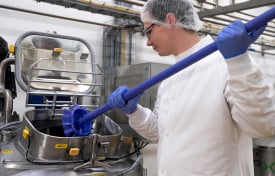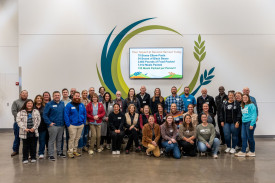dairy

- September 22, 2023
by Steve Funk | Senior Cheese Technologist at Nelson-Jameson
Cultures and enzymes are biological catalysts for dairy product production, but they’re also catalysts for the dairy industry as a whole. These hard-working elements work quietly behind the scenes to strengthen the industry’s brand reputation, increase dairy product market share, and delight consumers.
As the industry continues to adapt to changes and face new and long-standing challenges, cultures and enzymes help dairy advocates respond with answers. The trend toward plant-based alternatives is answered with vegetarian enzymes. Interest in health and wellness is answered with cultures that stimulate the probiotic benefits of yogurts, kefirs, and other cultured dairy. Here are five ways that cultures and enzymes are helping dairy processors.
Consumer Trends: Year after year, dairy processors aim to strike a balance between tradition and innovation. Consumers
- April 10, 2022
Nelson-Jameson is a proud member of the Innovation Center for US Dairy. The Center and its members have a common goal “to advance a shared social responsibility platform and demonstrate U.S. dairy’s collective commitment to provide the world responsibly produced dairy foods that nourish people, strengthen communities and foster a sustainable future.”
Nelson-Jameson and the Center have a combined passion for furthering food safety in our nation. Recently, the Center published a terrific food safety resource for the dairy industry that includes numerous Spanish language materials. Resources to take advantage of include: interactive training courses for artisan ice cream and cheesemakers, food safety plan writing assistance, training support, pathogen guidance documents, and much
- October 14, 2021
Maxiren® XDS and Nelson-Jameson make a GOUDA couple!
You FETA BRIE-LIEVE IT!
And yes, we are together for the long haul.Maxiren® XDS is a fermentation produced chymosin (FPC) that protects, preserves, and optimizes the required coagulant in the cheese process helping cheese reach its full potential of GRATE taste and big smiles. There is an increase of flexibility in the cheese production when Maxiren® XDS is involved. This extraordinary coagulant has a high specificity which lowers the amount of coagulant required, and aids in slowing the breakdown of cheese proteins, resulting in enhanced cheese textures. The enriched texture maintains a longer shelf life which allows shredding, slicing, and dicing to be smooth, natural, and more efficient through different cheese stages.
- August 04, 2021
Today we are celebrating 74 years of Nelson-Jameson being a successful family-owned and operated supplier to the food, dairy, and beverage industries! Our journey began in 1947 when Earl Nelson, his father Ted, Herb Jameson, and Bob Dougherty founded Nelson-Jameson as a dairy equipment and supply business in Toluca, IL. Their goal was to serve as a comprehensive resource for dairy plants, but they soon discovered that their Illinois location isn't ideal. From there, it was decided upon that the headquarters of the business would be moved to Marshfield, WI—the heart of dairy production.
Today, Nelson-Jameson is now run by the fourth
- July 28, 2021
Nelson-Jameson strives to not only be a resource of products, programs, services, and industry expertise, but to also be of service to the food industry and focus on the mutually shared goal of food safety and quality. This allows us to work with a whole host of professional organizations, academic programs, regulatory agencies, etc. Over the past several months, we have enjoyed engaging and becoming active with the Innovation Center for U.S. Dairy Food Safety Team. You may or may not be familiar with this volunteer organization, and even if you are, you may be surprised by the remarkable scope of resources available...
The Innovation Center for US Dairy is a consortium of dairy industry producers, educators, and organizations
- June 29, 2021
June is an important time of year here at Nelson-Jameson, not only is it June Dairy month, but it is also recognized as National Safety month! We find these two topics to be important in the success of our business—being a single source food, dairy, and beverage processing plant supplier. Some questions you may be pondering are, "How did these two topics become nationally recognized and what makes them so important?" and "How do they relate to Nelson-Jameson?" Here is an overview of the correlation:
Dairy Month:
June Dairy Month started out as National Milk Month in 1937 as a way to promote drinking milk, and was a way to distribute extra milk during the warm summer months. According to American Dairymen®, "This month was initially
- February 01, 2021
Resources made available with Nelson-Jameson's Learning Center! This educational learning library was created to encourage our customers to seek out information, when applicable, to aid them in making informed purchasing decisions within the food, dairy, and beverage industries. By providing this free resource for anyone to use, our goal is to have you feel comfortable and confident in the products you purchase.
An intriguing aspect of our Learning Center is that the information we are providing is supplied to us by manufacturers, and industry associations. It is our goal to relay to you the most up-to-date information for your convenience. The information within this resource falls into several categories: Laboratory & QA/QC, Packaging & Ingredients,
- August 04, 2020
Today we are celebrating 73 years of Nelson-Jameson being a successful family-owned and operated supplier to the food, dairy, and beverage industries! Our journey began in 1947 when Earl Nelson, his father Ted, Herb Jameson, and Bob Dougherty founded Nelson-Jameson as a dairy equipment and supply business in Toluca, IL. Their goal was to serve as a comprehensive resource for dairy plants, but they soon discovered that their Illinois location wasn't appropriate. From there, it was decided upon that the headquarters of the business would be moved to Marshfield, WI—the heart of dairy production.
Today, Nelson-Jameson is now run by the third and fourth generation of the Nelson family.
- May 27, 2020
While whipping up a quick dinner recently, I decided to use my handy-dandy microwave to get the rice cooking portion of the meal done. Just below, the thrilling smells of cooking vegetables and fish wafted up as I did my best not to burn what was in the pan in front of me on the stove. Feeling good about my culinary self momentarily, I casually glanced up at the microwave. Torrents of foam cascaded out of the vessel I had put the rice in...in the end, I had cooked rice and a significant starchy mess to clean up. When on top of a freshly poured beer, a healthy level of foam can bring me great joy; in this instance, it brought me back to Earth in terms of thinking about my talents in the kitchen.
Now, take that unfortunate incident and think about a food processing facility producing your favorite products. Foam happens in many food
- July 30, 2018
In recent months, it has come to our attention that there has been an increase in quality problems caused by Heterofermentative lactic bacteria that are not from starter cultures. These bacteria have been found growing on biofilms in the pasteurizer regen section of milk HTST’s, in some silage inoculants, in dairy powders and liquids used to fortify milk for cheesemaking, and on individual farms with certain cleaning issues. Once these are in the milk, they can’t be removed by pasteurization and will carry through into the cheese and whey powder by-products.
The Center for Dairy Research (CDR) in Madison has seen an increase in quality defects in cheese including off flavors such as “sour” gas formation in retail packages of cheese and cracking defects in blocks of cheese. Many companies are starting to include specifications for low spore count non-fat powders, liquid condensed skim and UF milk products, and also whey powders used in many other foods.







